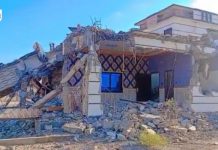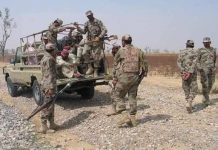Was Iran Behind The Kandahar Bombing That Killed UAE Diplomats?
LAWRENCE SELLIN
Retired Colonel, U.S. Army Reserve
It was not your typical Taliban improvised explosive device.
On January 10, 2017, a sophisticated radio-detonated, three-compartmental, military-grade RSX-TNT bomb, hidden days before in furniture after evading several security layers, exploded at intervals destroying a Kandahar government guesthouse conference room where prominent local officials were meeting with diplomats from the United Arab Emirates (UAE) to discuss that country’s humanitarian projects in Afghanistan.
The blast killed twelve people and wounded fourteen including Kandahar’s deputy governor, Abdul Ali Shamsi, Afghan diplomat Yama Quraishi, head of Afghanistan’s passport section in Washington and the nephew of former Afghan President Hamid Karzai’s wife, and five UAE humanitarian workers. Emirati ambassador to Afghanistan, Juma Mohammed Abdullah Al Kaabi, died of his wounds one month after the attack.
Three other attacks took place on that day, all suicide bombings, two in Kabul and one in Helmand’s capital Lashkar Gar, the Taliban claiming responsibility for all three.
Yet, the Taliban vehemently denied responsibility for the Kandahar bombing, blaming an “internal local rivalry” of Afghan government officials. A Taliban member based in Qatar said the movement was taking the extraordinary step of sending a delegation to mourn the slain diplomats and explain that it was not involved.
No group has ever claimed responsibility for the Kandahar bombing.
Following an investigation conducted by Afghanistan’s intelligence agency, the NDS, the Afghan Police and an investigation team from the UAE, NDS chief Mohammad Masoom Stanikzai stated that the guesthouse cook, Sayed Mahboob Agha, was the main operative behind the attack.
According to Stanikzai, the Taliban promised Agha $30,000 and a house in Pakistan in return for assisting with the attack. During a visit to Quetta, he was told that the UAE ambassador was coming to Kandahar and was the target. Subsequently, Agha made several trips to the Pakistani border town of Chaman to receive further instructions. The explosives were carried into the compound in bread baskets and placed under couches in the guesthouse’s meeting area ahead of the ambassador’s visit. Agha was given a phone to inform the Taliban when the targeted guests had arrived.
But was the “internal local rivalry” within the Taliban itself?
A power vacuum was created after the death of Taliban leader Mullah Mohammed Omar in 2013. When Mullah Akhtar Mansour replaced him in July 2015, questions arose concerning his legitimacy, infighting ensued and, in late 2015, a dissident faction led by Mullah Muhammad Rasool established itself in direct opposition to Mullah Mansour, each side’s supporters occasionally engaging in armed conflict.
Mullah Rasool, the Taliban’s shadow governor of Farah Province on the Iranian border, created the High Council of Afghanistan Islamic Emirate as an alternate center of gravity to the Quetta Shura or Islamic Emirate of Afghanistan headed by his competitor Mullah Mansour. The High Council reportedly has close ties with Iran and Mullah Rasool has been outspoken about the need for theTaliban to free itself from Pakistani dominance, especially after his arrest by Pakistan authorities during a visit in March 2016.
In May 2016, Mullah Mansour was killed by a US drone strike after returning from one of several trips to Iran. It is likely, Pakistani intelligence, the ISI, “fingered” Mansour to the Americans because of his inability or unwillingness to unify the Taliban, his flirtations with Iran and the cool relations he maintained with his Pakistani sponsors.
Mansour was succeeded by Hibatullah Akhundzada, a non-military deputy under Mullah Omar. In an effort to heal the rifts in the Taliban, Akhundzada appointed Sirajuddin Haqqani of the Haqqani Network and Mohammad Yaqoob, Mullah Omar’s son, as his deputies.
Yet the dispute with Rasool continued, who, in July 2016, in a widely-distributed video accused Akhundzada of being a tool of Pakistani intelligence and called for him to act independently. In a September 2017 interview, Mullah Manan Niazi, Rasool’s deputy, claimed to have captured suicide bombers sent by Akhundzada to assassinate him. On October 22, 2017, Voice of America reported that about 40 Taliban militants representing the Rasool and Akhundzada factions clashed in the Khifaan region of Shindand district in western Herat province, bordering with Iran.
Both Iran and Rasool would have had motives for the Kandahar attack, the former to punish the UAE and exert greater influence in Afghanistan, and the latter to discredit and challenge the Quetta Shura and Pakistan.
The UAE has allied itself with Saudi Arabia in opposing Iranian regional hegemony, including supporting the Syrian insurgency against Iran-backed President Bashar al-Assad, sending troops to fight alongside Saudi Arabia in Yemen against the Iran-supported Houthi rebels and repeated making effortswith other Gulf Cooperation Council states to isolate Iran’s Arab friend, Qatar.
And Rasool had opportunity. He is originally from Spin Boldack in Kandahar Province, a town on the Afghanistan-Pakistan border directly across from Chaman, Pakistan, where the plot was allegedly hatched. It is also interesting to note that the accused perpetrator, guesthouse cook Sayed Mahboob Agha, had been encouraged by unnamed Taliban members to move from Rasool’s stronghold in Farah Province to Kandahar. It is unlikely that any official investigation of the Kandahar attack would include a link to Rasool because of reported Afghan government funding of his splinter group.
All of the above also begs the question – rather than frontal assaults, why doesn’t the U.S. more effectively exploit the fault lines within and among Islamic terrorist groups?
Lawrence Sellin, Ph.D. is a retired US Army Reserve colonel, an IT command and control subject matter expert, trained in Arabic and Kurdish, and a veteran of Afghanistan, northern Iraq and a humanitarian mission to West Africa. He receives email at lawrence.sellin@gmail.com.






























